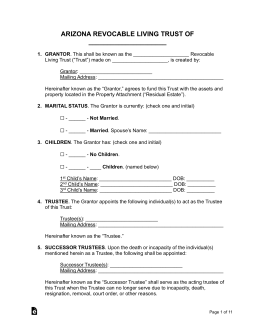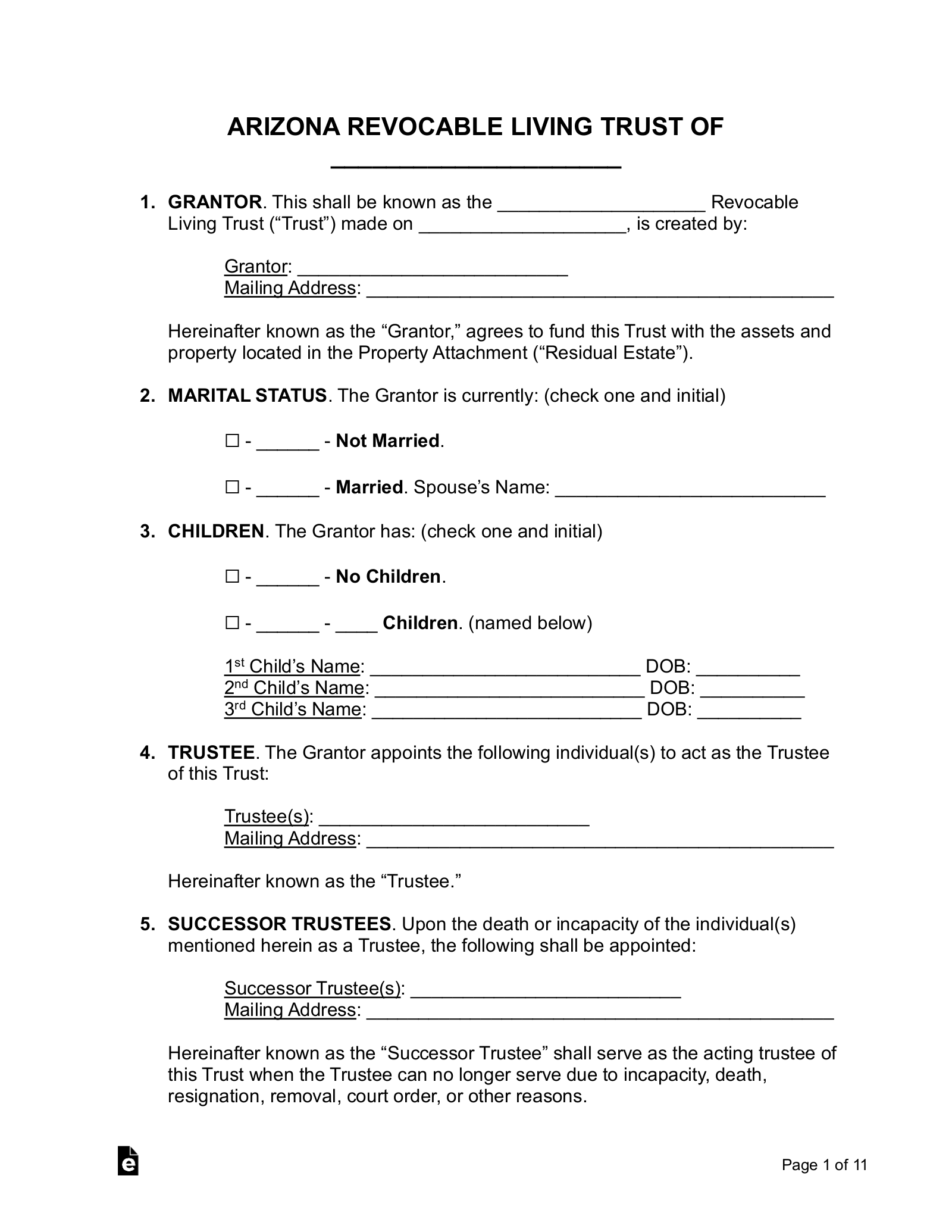Updated January 25, 2024
An Arizona living trust is a probate document that allows an individual (grantor) to place their assets in a trust managed by a trustee for the grantor’s lifetime. After death, the trust’s assets will be distributed to the beneficiaries by the named successor trustee in the document.
Requirements (4)
- Mental Capacity: A person creating a trust must have the mental capacity to do so;
- Named Beneficiaries: The trust must have a named beneficiary, such as individuals, charitable organizations, animals, or other 3rd parties.
- Trustee’s Duties: The trustee has duties to perform (such as managing the trust and distribution upon the grantor’s death; and
- Cannot be Same Person: The same person cannot be the sole trustee and the sole beneficiary.[1]
Registration
There are no registration requirements in Arizona.
Laws
Amending/Revoking – Unless a trust document specifically states it is irrevocable, a trust can be revoked or amended.[2]
Bond Requirement – A trustee is not required to obtain a bond unless the trust requires it or it is requested by a court.[3]
Duty to Inform – A trustee must inform the beneficiaries about the trust administration and information necessary to protect their assets. In addition, a trustee must inform beneficiaries within 60 days of accepting the trustee position and give their name, address, and phone number.[4]
Evidence of Oral Trust – An oral trust can be created with “clear and convincing evidence.”[5]
Penalty for Contesting a Trust – If there is language in a trust document that prohibits contesting the terms of a trust, such terms are unenforceable if probable cause exists for such a contest.[6]
Pet Trust – A trust is legally made for a pet to care for an animal. A person interested in the animal’s welfare can petition a court to confirm that proper care is being administered and remove the pet trustee if necessary.[7]
Trustee’s Compensation – Unless a trust specifically mentions the trustee’s compensation, a trustee is entitled to “reasonable” compensation given the circumstances of the trust.[8]
Trustee’s Duties – The trustee is responsible for administering the trust[9] and solely in the interest of the beneficiaries.[10]
Trustee’s Powers – Upon appointment and without permission from a 3rd party, a trustee has the authority to exercise the powers granted to them under the trust document.[11] Powers granted to the trustee include but are not limited to, the buying, selling, or managing of assets held in the trust.[12]
Trustee’s Reimbursement of Expenses – A trustee is entitled to be reimbursed from the trust’s assets, and with reasonable interest, for expenses related to properly managing the trust.[13] Such expenses include attorney’s fees and costs that arise from the trust’s management.[14]
Trustee’s Reporting – On an annual basis, a trustee must report the trust’s assets, liabilities, receipts, and disbursements to the beneficiaries.[15] Beneficiaries can waive the right to a trustee’s report if it is unnecessary.[16]
Trustee’s Resignation – If a trustee is to remove themselves from a trust, they must provide at least 30 days’ notice to the trust’s beneficiaries and the grantor (if living).[17]
Trust Certificate – Upon request by a 3rd party (other than a beneficiary), a trustee may create a trust certificate instead of providing a copy of a trust that mentions the following:
- The trust is valid, exists, and the date of execution;
- Grantor’s name;
- Trustee’s name and address;
- Trustee’s specific powers;
- If the trust is revocable;
- If more than one trustee is named, a description of how authority over the trust is managed; and
- The manner of taking title to trust property.[18]
Trusts Made in Another State – A trust made in another State is valid in Arizona.[19]
Sources
- ARS § 14-10402
- ARS § 14-10602(A)
- ARS § 14-10702(A)
- ARS § 14-10813(A)
- ARS § 14-10407
- ARS § 14-10113
- ARS § 14-10408
- ARS § 14-10708(A)
- ARS § 14-10801
- ARS § 14-10802
- ARS § 14-10815
- ARS § 14-10816
- ARS § 14-10709
- ARS § 14-11004
- ARS § 14-10813(B)(3)
- ARS § 14-10813(D)
- ARS § 14-10705
- ARS § 14-11013(A)
- ARS § 14-10403


